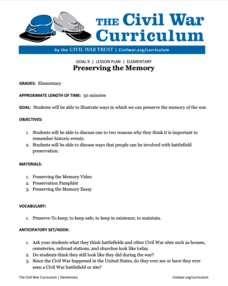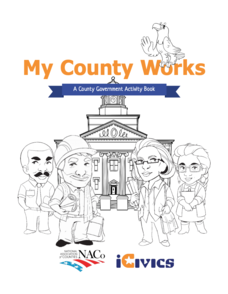American Battlefield Trust
Creating a Historic Site Lesson Plan
What makes a place historic? Using events from their own lives, learners consider this question, then deem places from their world historic. They then curate the experience for visitors, creating signs and other materials for their...
American Battlefield Trust
Preserving the Memory
Civil War battlefields themselves are under siege by development and other forces. Using materials from the Battlefield Trust, individuals explore local areas that face threat and write letters to support their preservation. An...
American Battlefield Trust
Civil War Personalities: Individual Examples of Character
What is a hero? What is character? Using biographies of figures during the Civil War, both famous and lesser known, scholars consider these questions. After brainstorming what they think makes a hero, they examine the lives of those who...
American Battlefield Trust
1864-1865: Bringing the War to an End
The Civil War—in its breathtaking ferocity—came to a close in 1864. However, turmoil echoed throughout the country's politics, including the presidential context between Lincoln and McClellan. Performing chronology and primary source...
American Battlefield Trust
Gettysburg Address: Abraham Lincoln's Greatest Speech
Most Americans have heard of the Gettysburg Address, but may not know what it means and why is it so important. Following guidance and scaffolded prompts, scholars analyze the short document that left an undeniable impact on the American...
American Battlefield Trust
The Home Front
Women and children played key roles during the Civil War, even if their voices are often lost in history. By studying letters and personal testimony from them, budding historians get a glimpse into the day-to-day life of civilians during...
American Battlefield Trust
Civil War Play
Everyone has a role to play. Young scholars step into history by taking on the roles of soldiers—both male and female—during the Civil War using a fictionalized play of what life was like on the battlefield. Pupils also examine the roles...
American Battlefield Trust
1861: The Country Goes to War
What was it like to know the Civil War was coming? Using a graphic timeline activity and excerpts of speeches from Abraham Lincoln and Jefferson Davis, learners consider the early days of the conflict. The resource includes prompts for...
American Battlefield Trust
Life at War
It looks like a cracker, but hardtack was anything but. The staple of the Civil War soldier's diet is one of many aspects of military life that scholars consider using letters from soldiers back home and images from slavery. A PowerPoint...
American Battlefield Trust
1862: Antietam and Emancipation
The Emancipation Proclamation shifted the tone and purpose of the Civil War. Using a primary source analysis, pupils consider the significance of the document. A second activity investigates the founding of the United States Colored...
New York City Department of Education
Grade 5 Literacy: TCRWP Nonfiction Reading and Opinion/Argument Writing
Choose a side! Pupils watch and read several nonfiction resources about zoos. After gathering their research, they choose a side either for or against closing zoos. Scholars complete KWL charts, anticipation guides, flow charts, and...
Utah Education Network (UEN)
Utah Open Textbook: 5th Grade Science
How do Earth's changes affect humans? Pupils learn about physical and chemical changes on Earth and how they lead to erosion, earthquakes, and volcanoes. Using the text, they also explore the concepts of electricity and magnetism by...
Florida Center for Reading Research
Comprehension: Text Analysis, Fiction and Nonfiction Find
Scholars analyze fiction and nonfiction text and fill in a worksheet detailing the text's title, genre, and reason for its classification.
Florida Center for Reading Research
Comprehension: Monitoring for Understanding, What Do You Know?
An activity promotes reading comprehension. Readers analyze a text of their choice while activating prior knowledge and asking and answering questions. Scholars enforce multiple strategies to improve comprehension.
Carolina K-12
The Mini Page: July 14 is Bastille Day
July 14th, 1789 marked the beginning of the French Revolution and the end of French aristocracy. Read all about Bastille Day with a kids' newspaper that also includes articles on American popular culture, the circulatory system, and...
ReadWriteThink
Webcams in the Classroom: Animal Inquiry and Observation
Boost observational skills with an inquiry-based lesson that takes scholars on a virtual field trip. With help from webcams, learners observe animals in a zoo or aquarium. Observations go into a journal and a discussion is held to review...
Library of Congress
Marco Paul's Travels on the Erie Canal: An Educational Voyage
Following the book, Marco Paul's Travels on the Erie Canal, readers complete an activity for each chapter, take part in discussions, and respond to several questions. To show what they know, scholars create an alphabet book using primary...
iCivics
My County Works
A 22-page packet sheds light on the hard work taking place at a county's seat. Scholars read brief informational text and fill in information about their own county workers. Pages take you to a department around the county site each...
Jamestown-Yorktown Foundation
What Was Everyday Life like in Colonial Virginia?
What was everyday life like in Colonial Virginia? To find the answer cooperative groups work collaboratively to read an informational handout and complete a graphic organizer. The speaker of the group then shares their new-found...
Jamestown-Yorktown Foundation
What Was Everyday Life like in Colonial Virginia?
After reflecting on jobs people perform in the present day, scholars discuss what they believe jobs would have been like in Colonial Virginia during the American Revolution. Small groups then perform a jigsaw using informational packets....
Skills Workshop
Rosa Louise Parks
One moment can define the rest of your life—and in the case of Rosa Parks and her famous decision in December 1955, it can define the trajectory of a nation. Elementary readers learn more about the life and message of Rosa Parks with an...
Soft Schools
Civil Rights
Informational text about the Civil Rights Movement challenges young historians to prove their reading comprehension skills with six multiple choice questions. After answers are submitted a new screen displays a score, answers—correct and...
Mr. Nussbaum
Martin Luther King Reading Comprehension
Boost reading comprehension with an interactive website featuring an informational passage about Martin Luther King Jr. Scholars read, or listen to, several paragraphs detailing MLK's life in order to answer seven multiple choice...
Louisiana Department of Education
The Lion, The Witch, and The Wardrobe
Compare and contrast popular works of fantasy literature with an in-depth reading comprehension unit. Language arts learners study the theme of good versus evil, fantastical characters and symbols, and the value of a visual...

























